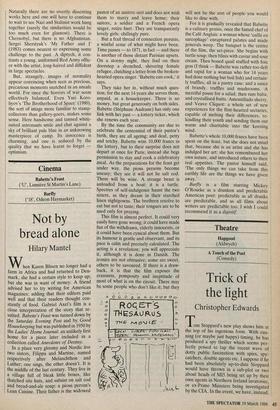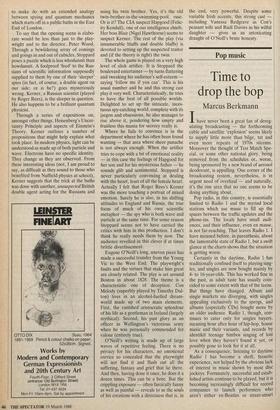Theatre
Hapgood (Aldwych) A Touch of the Poet (Comedy)
Trick of the light
Christopher Edwards
Tom Stoppard's new play shows him at the top of his ingenious form. With cun- ning (or maybe just happy) timing, he has produced a spy thriller which seems per- fectly poised to tap the recent wave of dotty public fascination with spies, spy- catchers, double agents etc. I suppose if he had been absolutely up-to-date Stoppard would have thrown in a sub-plot or two about heads of MI5 being set up by their own agents in Northern Ireland lavatories, or ex-Prime Ministers being investigated by the CIA. In the event, we have, instead, to make do with an extended analogy between spying and quantum mechanics which starts off in a public baths in the East End of London.
To say that the opening scene is elabo- rate would be less than just to the play- wright and to the director, Peter Wood. Through a bewildering array of comings and goings in and out of cubicles, Stoppard poses a puzzle which is less whodunnit than howdunnit. A foolproof 'feed' to the Rus- sians of scientific information supposedly supplied to them by one of their 'sleeper' spies (in fact, of course, a double agent on our side; or is he?) goes mysteriously wrong. Kerner, a Russian scientist (played by Roger Rees), is the sleeper in question. He also happens to be a brilliant quantum physicist.
Through a series of expositions on, amongst other things, Heisenberg's Uncer- tainty Principle and aspects of Einstein's Theory, Kerner outlines a number of propositions that might help explain what took place. In modern physics, light can be understood as made up of both particle and wave. Electrons have no specific identity. They change as they are observed. From these interesting ideas (not, I am proud to say, as difficult as they sound to those who benefited from Nuffield physics at school), Kerner suggests that the trick at the baths was done with another, unsuspected British double agent acting for the Russians and using his twin brother. Yes, it's the old twin-brother-in-the-swimming-pool ruse. Or is it? The CIA suspect Hapgood (Felic- ity Kendall), one of our intelligence chiefs. Her boss Blair (Nigel Hawthorne) seems to suspect Kerner. The rest of the play (via innumerable bluffs and double bluffs) is devoted to setting up the suspected traitor and (if the theory is right) the twin.
The whole game is played on a very high level of slick artifice. It is Stoppard the boulevard entertainer — by turns flattering and tweaking his audience's self-esteem saying 'follow me if you can'. This is his usual number and he and this strong cast play it very well. Characteristically, he tries to have the best of all possible worlds. Delighted to set up the intricate, inces- tuous spy-catching world, complete with its jargon and obsessions, he also manages to rise above it, pondering how empty and fruitless this mania for secrecy really is.
Where he fails to convince is in the department where he has often been found wanting — that area where sheer panache is not always enough. When the artifice tries to cope with a bit of emotional reality — in this case the feelings of Hapgood for her son and for his mysterious father — he sounds glib and sentimental. Stoppard is never particularly convincing at dealing with the heart, least of all the female heart. Actually I felt that Roger Rees's Kerner was the more touching a portrait of mixed emotion. Surely he is also, in his shifting attitudes to England and Russia, the true focus of much of his own scientific metaphor — the spy who is both wave and particle at the same time. For some reason Stoppard seems not to have carried the critics with him in this production. I don't think he really needs them by now. The audience revelled in this clever if at times brittle divertissement.
Eugene O'Neill's long, uneven piece has made a successful transfer from the Young Vic to the West End. The playwright's faults and the virtues that make him great are closely related. The play is set around Boston in about 1828. The theme is a characteristic one of deception. Con Melody (superbly played by Timothy Dal- ton) lives in an alcohol-fuelled dream- world made up of two main elements. First, the vanished aristocratic splendour of his life as a gentleman in Ireland (largely mythical). Second, his past glory as an officer in Wellington's victorious army when he was personally commended for valour (entirely true).
O'Neill's writing is made up of large waves of repetitive feeling. There is no privacy for his characters, no emotional crevice so concealed that the playwright will not find it and flush out all the suffering, fantasy and grief that lie there. And then, having done it once, he does it a dozen times. This can be a bore. But the crippling exposure — often farcically funny as well as painful — reveals to us the souls of his creations with a dir&tness that is, in the end, very powerful. Despite some variable Irish accents, this strong cast including Vanessa Redgrave as Con's peasant wife and Rudi Davies as his wilful daughter — gives us an intoxicating draught of O'Neill's brute honesty.

























































 Previous page
Previous page